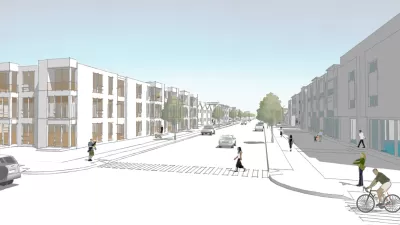The city of Portland is considering a new inclusionary zoning policy, but some believe that inclusionary zoning has the opposite of its intended effect.

The debate about inclusionary zoning as a policy solution for housing affordability shifts to Portland, Oregon, where the city is beginning to consider the terms of a new inclusionary zoning policy.
The inclusionary zoning policy is up for debate following a decision by the state to repeal a statewide ban on inclusionary housing requirements. With Portland ready to consider a new inclusionary zoning policy, the Northwest Chapter of the Urban Land Institute recently held a forum to discuss inclusionary zoning, which Joe Cortright attended as a panelist.
Cortright shares a few of his talking points, some of which he’s made in the past, which focus on the idea that inclusionary zoning might not be an effective tool to improve housing affordability.
The bigger concern about inclusionary zoning is that it tends to drive up the cost of building new housing, thereby restricting supply, and actually aggravating market-wide affordability problems. While the comparative handful of new units set aside for low or moderate income households are visible, there is an invisible cost in the form of units not built, and consequently, higher market rents for everyone.
Mike Wilkerson of ECONorthwest also participated in the event, presentinga summary of his firm’s recent analysis of inclusionary policies (commissioned by the Urban Land Institute), which joins a growing joins what Cortright describes as a “growing body of research that attempts to model current development costs and the impacts of inclusionary (and other) requirements on the cost and likelihood of housing development.” One of the takeaways that Cortright has identified from all this research is a great deal of uncertainty over the effects of policy changes, like inclusionary zoning, and the future of the development market.
FULL STORY: Portland considers inclusionary zoning

Alabama: Trump Terminates Settlements for Black Communities Harmed By Raw Sewage
Trump deemed the landmark civil rights agreement “illegal DEI and environmental justice policy.”

Study: Maui’s Plan to Convert Vacation Rentals to Long-Term Housing Could Cause Nearly $1 Billion Economic Loss
The plan would reduce visitor accommodation by 25% resulting in 1,900 jobs lost.

Planetizen Federal Action Tracker
A weekly monitor of how Trump’s orders and actions are impacting planners and planning in America.

Wind Energy on the Rise Despite Federal Policy Reversal
The Trump administration is revoking federal support for renewable energy, but demand for new projects continues unabated.

Passengers Flock to Caltrain After Electrification
The new electric trains are running faster and more reliably, leading to strong ridership growth on the Bay Area rail system.

Texas Churches Rally Behind ‘Yes in God’s Back Yard’ Legislation
Religious leaders want the state to reduce zoning regulations to streamline leasing church-owned land to housing developers.
Urban Design for Planners 1: Software Tools
This six-course series explores essential urban design concepts using open source software and equips planners with the tools they need to participate fully in the urban design process.
Planning for Universal Design
Learn the tools for implementing Universal Design in planning regulations.
Caltrans
Smith Gee Studio
Institute for Housing and Urban Development Studies (IHS)
City of Grandview
Harvard GSD Executive Education
Toledo-Lucas County Plan Commissions
Salt Lake City
NYU Wagner Graduate School of Public Service




























